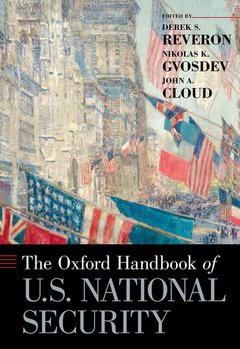Description
The Oxford Handbook of U.S. National Security
Oxford Handbooks Series
Coordinators: Reveron Derek S., Gvosdev Nikolas K., Cloud John A.
Language: English
Subject for The Oxford Handbook of U.S. National Security:
Publication date: 06-2018
704 p. · 18.5x25.5 cm · Hardback
704 p. · 18.5x25.5 cm · Hardback
Description
/li>Biography
/li>
National security is pervasive in government and society, but there is little scholarly attention devoted to understanding the context, institutions, and processes the U.S. government uses to promote the general welfare. The Oxford Handbook of U.S. National Security aims to fill this gap. Coming from academia and the national security community, its contributors analyze key institutions and processes that promote the peace and prosperity of the United States and, by extension, its allies and other partners. By examining contemporary challenges to U.S. national security, contributors consider ways to advance national interests. The United States is entering uncharted waters. The assumptions and verities of the Washington consensus and the early post-Cold War have broken down. After 15 years of war and the inability of two presidents to set a new long-term U.S. foreign policy approach in place, the uncertainties of the Trump administration symbolize the questioning of assumptions that is now going on as Americans work to re-define their place in the world. This handbook serves as a "how to" guide for students and practitioners to understand the key issues and roadblocks confronting those working to improve national security. The first section establishes the scope of national security highlighting the important debates to bridge the practitioner and scholarly approaches to national security. The second section outlines the major national security actors in the U.S. government, describes the legislative authorities and appropriations available to each institution, and considers the organizational essence of each actor to explain behavior during policy discussions. It also examines the tools of national security such as diplomacy, arms control, and economic statecraft. The third section focuses on underlying strategic approaches to national security addressing deterrence, nuclear and cyber issues, and multilateral approaches to foreign policy. The final section surveys the landscape of contemporary national security challenges. This is a critical resource for anyone trying to understand the complex mechanisms and institutions that govern U.S. national security.
Derek S. Reveron is a Professor of National Security Affairs at the U.S. Naval War College. He specializes in strategy development, non-state security challenges, and defense policy. He has authored or edited twelve books and is a faculty affiliate at the Belfer Center for Science and International Affairs at Harvard Kennedy School. He received an M.A. in political science and a Ph.D. in public policy analysis from the University of Illinois at Chicago. Nikolas K. Gvosdev is Professor of National Security Affairs at the U.S. Naval War College and the Jerome E. Levy Chair for Economic Geography and National Security. He was the Editor of The National Interest magazine, a Senior Fellow of Strategic Studies at The Nixon Center in Washington, D.C., and is currently a senior fellow with the Foreign Policy Research Institute. He received his Ph.D. from St Antony's College, Oxford University, where he studied on a Rhodes Scholarship. Ambassador John A. Cloud is a Professor of National Security Affairs and the William B. Ruger Chair of National Security Economics at the U.S. Naval War College. As a retired career diplomat, he is a specialist in European and economic issues who served as U.S. Ambassador to the Republic of Lithuania, Deputy Chief of Mission at the United States Embassy in Berlin, Germany, on the National Security Council staff, and other Foreign Service assignments in Belgium, Germany, Poland and Mexico. Mr. Cloud received his B.A. from the University of Connecticut in 1975, and a M.A. in International Affairs from George Washington University in 1977.
© 2024 LAVOISIER S.A.S.




